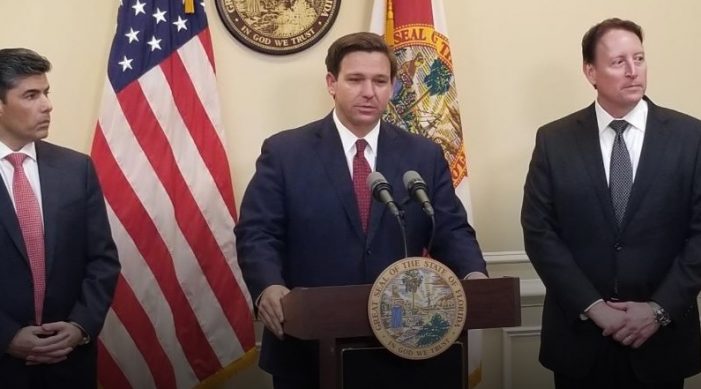By Jim Turner, The News Service of Florida
TALLAHASSEE — State lawmakers on Thursday approved a record $93.2 billion budget for next year, with attention already focused on a potential need to revisit the spending plan this summer as the novel coronavirus upends the economy.
The budget (HB 5001), which takes effect July 1, was approved in a 104-0 vote by the House and a 32-0 vote by the Senate.
The votes came nearly a week after the scheduled end of the 60-day annual session and without the ceremonial back-slapping that typically marks the finish of each session.
Gov. Ron DeSantis, saying the coronavirus crisis is causing “economic dislocations,” said he expects to use his line-item veto power more than initially planned to help offset what are expected to be reductions in state tax revenue.
“I think it’s safe to say that the vetoes are just simply going to be different today than they would have been had this budget come out two months ago,” DeSantis said during a news conference with House Speaker Jose Oliva and Senate President Bill Galvano after the budget was approved. “I don’t see any way around that. We’re already looking at different ways to add stability.”
For now, DeSantis said areas of the budget where he sought increases, such as teacher pay raises and environmental funding are safe.
While unemployment claims are spiking, Oliva said the state would be helped by a booming economy the past few years that led to increased revenues. He said he anticipates the state has enough money to get through a crisis that isn’t prolonged.
“We’re still several months out,” Oliva said. “We’re sitting on strong reserves. We think that there is enough of a buffer there to be able to sustain at least a couple of months of difficult times.”
Galvano said “we’ll see what the future holds.”
“Where we are today, what we’ve done today, is the appropriate place to be,” Galvano said.
Before voting on the budget, House members Thursday were given health screenings amid concerns that the highly contagious virus, known as COVID-19, could be spread in the House chamber. More than 20 lawmakers were excused from returning to Tallahassee after citing a desire to take extra precautions against COVID-19 or because of “prior commitments.”
The House and Senate public galleries were closed for the session. People entering the Capitol — which has restricted public access to minimize exposure — were required to answer questions about their health, recent travels and interactions with large groups and people potentially impacted by COVID-19.
The newly approved budget directs $27.3 million in federal dollars and another $25.1 million from the state to the Department of Health’s efforts to combat COVID-19.
Rep. Evan Jenne, D-Dania Beach, expressed concern that lawmakers will have to dip into reserves because of COVID-19, specifically to help protect and assist health care workers.
“It’s not going to be enough as we move forward,” Jenne said.
In the closing weeks of the session, legislative leaders set aside an additional $300 million in reserves to help brace against the economic slowdown. Three major reserve funds total about $3.9 billion.
The virus has prompted numerous entertainment venues, such as theme parks and Major League Baseball spring training, to shut down and has idled cruise ships, moves that could have a substantial impact on a state economy dependent on tourism.
DeSantis on Tuesday ordered bars and nightclubs closed for a month and limited gatherings at beaches to 10 people or less.
House Higher Education Appropriations Chairman Randy Fine, R-Palm Bay, said he wasn’t optimistic the current level of reserves will carry the state through the crisis.
“It’s March, so we have months to figure it out,” Fine said. “I’m fairly certain there will be a lot of work going on. We are, unfortunately, passing a budget that is based on a lot of economic assumptions that no longer are the case.”
Sen. Tom Lee, R-Thonotosassa, while calling the budget “really responsible,” also painted a bleak picture of the impact of COVID-19 on the Florida economy. Lee, a former Senate president, recalled the effects on the economy of the Sept. 11, 2001, terrorist attacks.
“This feels worse,” Lee said.
If the Legislature needs to change the budget, Lee also said it should do it as soon as possible.
Sen. Gary Farmer, D-Fort Lauderdale, said he anticipates a need for a special session.
“It’s extremely likely that we will have to reconvene in the coming months to deal with the dramatic effects of the coronavirus,” Farmer said.
The new spending plan includes money for many of the priorities of DeSantis and legislative leaders.
For example, it includes about $690 million for Everglades restoration and water projects and $500 million for teacher-pay increases. Also, it includes $100 million for the Florida Forever conservation program, $50 million for the Visit Florida tourism-marketing agency and 3 percent across-the-board pay raises for state employees.
The largest chunk of the budget, $39.36 billion, goes to health and human services programs.
In final negotiations, the House and Senate agreed to not trim $64 million in supplemental Medicaid payments that go to 28 hospitals that treat the majority of Medicaid patients in the state. A push to eliminate the supplemental payments and instead direct the money to increase base Medicaid rates for all hospitals was backed by the hospital chain HCA.
The budget also boosts Medicaid payment rates for nursing homes and funnels additional money to the state Agency for Persons with Disabilities. It also includes $10 million for the Agency for Health Care Administration to hire a contractor to assist with a Canadian prescription-drug importation program championed by DeSantis.
— News Service senior writer Dara Kam, Assignment Manager Tom Urban and staff writer Ana Ceballos contributed to this report.

